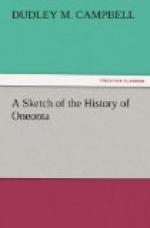“Our way was generally obstructed by fallen trees, old logs, miry places, pointed rocks and entangled roots, which were not to be avoided. We were alternately on the ridge of a lofty mountain and in the depths of a valley. At best, our path was obscure and we needed guides to go before us. Night approaches, we halt and a fire is kindled; the kettles are filled and we refresh ourselves; and we adore Divine Providence, returning thanks for the salvations of the day and committing ourselves to God for the night, whose presence is equally in the recesses of the solitary wilderness and in the social walks of the populous city. With the starry heavens above me, and having the earth for my bed, I roll myself in a blanket, and without a dream to disturb my repose, pass the night in quiet, and never awake till the eye-lids of morning are opened, and the penetrating rays of the sun look through the surrounding foliage.
“It may not be impertinent to observe that in this wilderness we neither see nor hear any birds of music. These frequent only the abodes of man. There is one wood-bird, not often seen, but heard without any melody in his note, in every part of the wilderness wherever I have been. In some parts of this extensive country, the wild pigeons breed in numbers almost infinite. I once passed an extensive valley where they had rested; and for six or eight miles, where the trees were near and thick, every tree had a number of nests upon it, and some not less than fifteen or twenty upon them. But as soon as their young are able, they take wing and are seen no more.”
The next extract is from the journal of May 30th, 1753:
“We were impatient to see the famous Susquehanna, and as soon as we came, Mr. Woodbridge and I walked down to its banks. Disappointed at the smallness of its stream, he exclaimed, ‘Is this the Susquehanna?’
“When we returned our young Indians, who had halted, came in, looking as terrible and ugly as they could, having bedaubed their faces with vermilion, lampblack, white-lead, etc. A young Indian always carries with him his looking-glass and paint; and does not consider himself as dressed until he has adjusted his countenance by their assistance.
“Mr. Woodbridge and Mrs. Ashley, our interpreter, could not travel any further by land. We therefore concluded to get a canoe and convey them by water. From this place [now Colliers] to Onohoghwage is three days’ journey; and how bad the traveling is we cannot tell.
“May 31st, [1753.] We met with difficulty about getting a canoe, and sent an Indian into the woods to get ready a bark, but he made small progress.
“In the afternoon came from Otsego lake, which is the source of this stream, George Windecker and another, in a small batteau, with goods and rum, going down to Onohoghwage upon a trading voyage. We agreed with them to carry the interpreter and Mr. Woodbridge in their batteau; and bought a wooden canoe to carry our flour and baggage.




